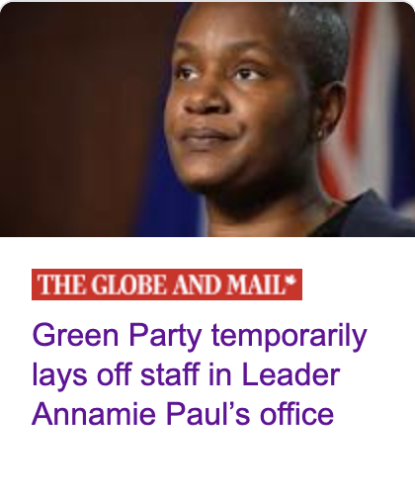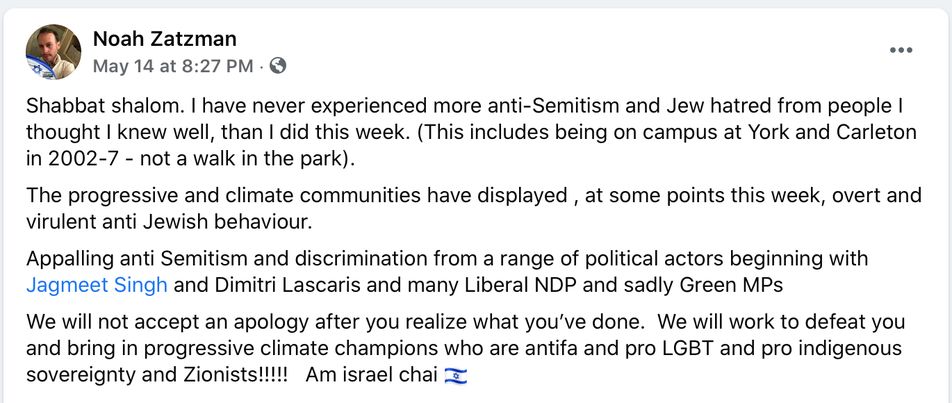
The feud within the Green Party of Canada comes at the worst possible time. Political parties should never air their dirty laundry in public, especially not when Justin Trudeau is expected to within weeks.
But that’s exactly what the Green Party is doing. The party executive just announced they are firing half of the Green Party staff, and a no-confidence vote is scheduled for the party leader. As a result, the Green’s chances of expanding their success into northern Vancouver Island – or anywhere in Canada – are evaporating faster than the Canadian’s lost the Stanley Cup.
I’m sure there is a lot of blame to share around, but the ultimate person responsible for the mess within the Green Party is its leader, Annamie Paul.
Why? Because leaders need to lead, and many of Paul’s problems are self-inflicted wounds.
Not to say that the party executive hasn’t made serious mistakes. Of course they have, but it is the job of a leader to minimize the impact of others’ mistakes, not blow them up as Paul has done.
Let’s examine Paul’s performance against some of the critical traits of a successful leader.
Positive Energy & Attitude

Successful leaders need to create a positive workplace culture yet set guard rails for appropriate conduct. This is especially true within the viper’s den of political parties.
All political parties have internal disputes about policy. Imagine the internal debates among the NDP over gun control or between Conservatives about abortion. Paul’s handling of the disagreement over Israeli-Palestinian issues was a masterclass in poor leadership. Despite differences, Paul’s job as party leader was to make sure her team worked together like a Stanley Cup-winning powerplay. She failed spectacularly.
Be Accountable
Successful leaders embody accountability. They often take the blame even if it’s not entirely their fault. But, if they blame others, they act decisively to stop the bleeding wound. Paul did neither.
Compounding her mistake in allowing the internal Green Party Israeli-Palestinian policy dispute to become public, Paul then aggravated the problem by blaming others and dismissing legitimate criticism as “racist and sexist.” Her job was to block the 100 MPH slapshot, not pass the puck to the opponent’s best sniper.
No doubt – as an intelligent, accomplished, black, Jewish woman – Paul has been subjected to brutal racist, sexist and anti-semitic attacks. And clearly, the party didn’t create open ice so a black Jewish woman could get a clean shot on goal. But publicly attacking critics in her own party as racist – even if they deserved it – is like knocking the puck into your own net in overtime during game seven of the Stanley Cup.
The Green Party’s value to swing voters is as a principled, moral landing spot. But, in the short term, the Green Party wants to be the safe space for people dissatisfied by the corruption of Trudeau’s Liberals, frustrated by the NDP’s repetitive “working family” rhetoric or alienated by O’Toole’s mean, climate-denying Conservatives.
Paul gutted this value proposition by exposing her party’s petty internal squabbles in such acidic language.
Communicate Expectations
Successful leaders need to communicate their party’s core values and mission – ensuring that their vision is correctly translated and executed.
Clearly, Paul didn’t set appropriate guard rails around an issue on which her staff and caucus had strong conflicting opinions.
Paul either knew the depth of the disagreement and didn’t communicate her expectations, or she wasn’t aware of the simmering dispute, which raises a host of other leadership questions. Either way, she failed.
Manage Her Team
Successful leaders know their colleague’s strengths and weaknesses and how to neutralize or arrange them strategically.
Paul inherited a caucus with three sitting Green Members of Parliament (MPs) – the largest in Green’s history. Within eight months of being elected leader, one-third of Paul’s team abandoned her. Jenica Atwin (Fredericton, N.B.), the first federal Green MP to breakthrough and get elected in Atlantic Canada, walked across the aisle to join Trudeau’s Liberals while criticizing Paul’s leadership.
Atwin’s and Paul’s explanations of the dispute and their relationship are vastly different. Both can’t be telling the truth.
The other two Green MPs – Elizabeth May (Saanich-Gulf Islands) and Paul Manly (Nanaimo)- also tell conflicting stories about what transpired in the lead-up to Atwin’s departure. There is clearly no love between the key players.
It doesn’t matter who you believe. Who said, or did, what is not the central issue. The critical question is: if Paul can’t manage a small caucus of three opinionated MPs, how in the heck is she ever going to lead a caucus of a dozen or even more MPs from across the country?
If Green Party voters aren’t asking themselves this in the lead-up to the no-confidence vote on July 20th, I can guarantee the other parties will during the next election.
But the dysfunctional caucus was only the beginning of the problem.
Paul’s harsh reaction to her critics within the party made a bad problem worse. Dismissing valid questions about her leadership as those of “a handful of disaffected party officials making racist and sexist claims” and staging a “coup” – won’t go into the leadership hall of fame.
Make Decisions
Successful leaders make hard decisions; they either dialogue with colleagues to reach a strategic conclusion or make the decision themselves.
Not only did she fail to contain the Atwin dispute, but Paul said nothing when Noah Zatzman, her chosen Chief of Staff, went public accusing Green MPs and others of anti-Semitism. When Zatzman unbelievably tweeted he would target these MPs for defeat in the next election, she said – and did nothing.
Does that mean Paul agreed with her aide, or even put him up to it? We have no idea, and she won’t say.
Or even more damning for Paul’s leadership is a possibility that she did set the guard rails for her Chief of Staff, and he just decided to ignore her.
Either way, the only appropriate response for a party leader when an aide goes rogue like Zatzman is to fire them immediately. Tragically, Paul failed a leadership test once again.
Unfortunate timing for Norther Islanders
Potential Green Party voters on northern Vancouver Island must be gritting their teeth over the timing of Paul’s leadership failures. With heat domes smashing records, algae bloom fouling coastlines, and fires destroying cities, climate change has moved to the top of people’s list of concerns.
Who is better positioned to take advantage of this in a summer or fall election? Certainly not the Green Party.
Instead of ratcheting up their efforts to set up the voter contact systems, train the volunteers, and raise the money to rally the troops for a breakthrough election in ridings like Courtenay-Alberni and North Island-Powell River, Greens are feuding among themselves around issues marginal to their core.
While important from a global human rights perspective, I doubt the ins and outs of the Green Party’s Israel-Palestine policy will be the ballot box issue for many Canadian voters.
Unfortunately, the feud between Paul and the 13 member party executive seems to be intensifying just as the clock ticks toward an election. A no-confidence vote over Paul’s leadership is scheduled for July 20th.
Meanwhile, the Green Party has only nominated 40 out of 338 candidates.
Despite all the talk, at the end of the day, leaders need to lead. Sadly, by any objective criteria, Annamie Paul’s leadership has been a failure.









